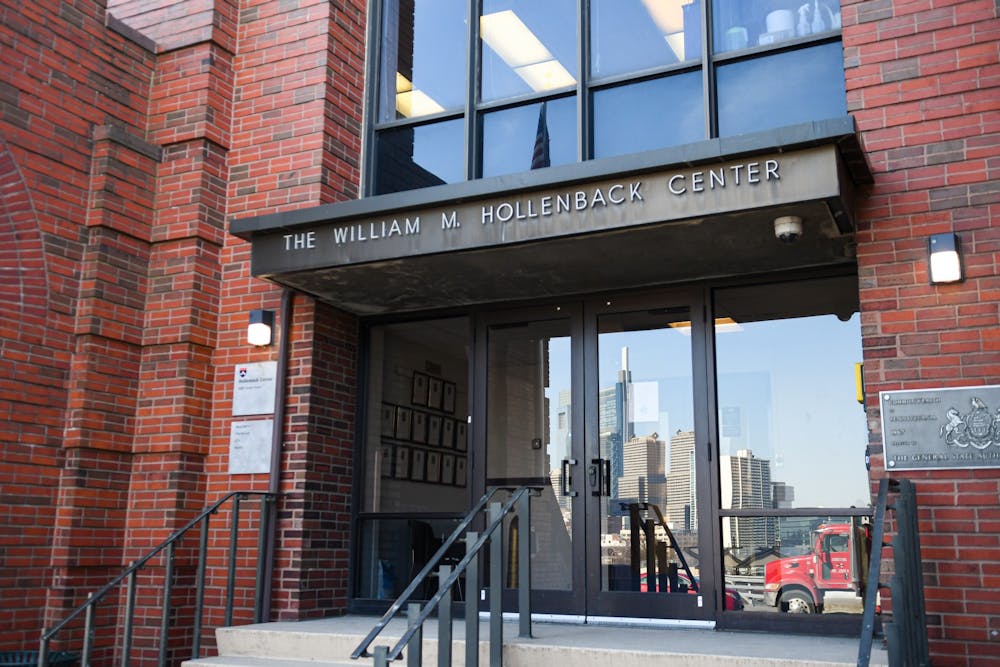“Love is Fury” blemishes the subdued blue wallpaper in blockish, dark text. Posters hang loosely from the same wall, accompanied by a white board filled with incoherent scribbles and anecdotes dating back to the early 2000s. Albums ranging from bonus track LPs to brief EPs lean against CDs. The live music studio, record archives, meeting room, and broadcasting booth only occupy a small section of the Hollenback Center, but this station makes up for the lack of space with an overwhelming rush of personalized comfort and character. Giselle Wagner, a College junior and the station manager, described it best as “a place where individuals can rely on creative expression and escape from the pressures of Penn.”
However, escape may no longer be an option. Wagner detailed that on Jan. 25, with no prior warning, Office of Student Affairs Associate Director Rodney Robinson told her that WQHS (West Quad Hill Superblock) would lose access to their space from April 2023 to April 2024. The Hollenback Center would be undergoing HVAC renovations for an entire year, and with no alternative home for the station, Penn will be left in radio silence.
Not everyone is a radio enjoyer, especially now that Apple Music and Spotify promise exactly what you want to hear whenever you want to hear it, but WQHS and stations like it offer you a new sound that streaming services rarely show you. Instead of losing yourself in your favorite song or the same old artist that you have grown to love, you can explore college radio and see what is out there. Podcasts and talk shows also make their rounds on the 24-hour stream, so there is never a lull on air.

To protect WQHS, the station has petitioned for a temporary relocation provided by the University. Their Change.org petition amassed over 500 signatures, but Penn has not yet budged on its initial stance despite taking heat from listeners and student radio show hosts alike. One more signature could mean the difference between live music or white noise, given that this is far from the first time they have had issues.
“There has been a lack of communication between the radio station and Penn for years,” Wagner admitted.
Just last year, Penn left her and other broadcasters without a key to access the station for a month — an entire month off the air because they could not unlock the door. This instance adds to the list of difficulties that have plagued Penn’s only student-run radio since the loss of their broadcasting tower to a storm about twenty years ago.
These newest renovations to the building, which houses WQHS and NROTC, will not only take student voices and music off the air but will also jeopardize the equipment and artwork that gives the space its instant appeal. Evie Klein, College junior and station outreach director, asked, “What are we going to do with this stuff? Put it in a storage locker and broadcast from there? I mean, come on.” Turntables, amps, desktop computers, and hundreds of valuable albums and CDs will be left without a home. Leaving them there is a risk that no one would take, but currently, there is no alternative.
“Another thing I’m nervous about is that they’ll take the walls down and put insulation in because that was a big part of the renovation as well,” Wagner said.

For reference, the drop ceiling panels of the room have fallen apart in recent years due to water damage. When it rains, the room suffers from various leaks, and anyone visiting the station can find a perfect view of the roof and entire HVAC system by looking through a gaping hole in the ceiling. WQHS, without a doubt, needs repairs supplied by Penn, but is this the right way to go about the issue? Kicking out an entire student group who are considering paths in entertainment and radio?
Klein also understood that the building is in need of repair but questioned the timing of it all. “The fact that this building has reached this state where there’s a giant hole in the ceiling at Penn is insane.” She joked, “Imagine if that happened at Huntsman where an escalator stops working for ten minutes, and they have three mechanics working on it. You could just use stairs!”
The administration and college radio have had a rocky history since the latter took root in the 1970s. This memorandum against WQHS marks a near-historic low for relations between the two, and anyone associated with Penn who appreciates music in any capacity should recognize this moment as a call to action. For a school which stresses students with preprofessionalism, stripping away a possible career interest or creative comfort in music cannot go ignored.
WQHS needs its rights protected and its facilities enhanced, not just repaired. For any music listener, enjoyer, performer, or even partier, take part in student radio. If you have an underground music taste or simply play “Mr. Brightside” on repeat, you can support others who do the same. Maybe listen to different radio shows, look at the blog, or ask to join the team yourself — they are always looking for new faces. Maybe you could spread the word or lay the groundwork for a new radio tower and FM frequency license. Wagner encourages that WQHS “introduces you to new music, new stories, new perspectives just like any other broadcasting station, and I think we are the future of broadcasting.” You can show Penn that music matters. If not, it might simply disappear.

C.H. HENRY is a College sophomore studying communication and diplomatic history from Nashville, Tenn. His email address is chhen@sas.upenn.edu.









